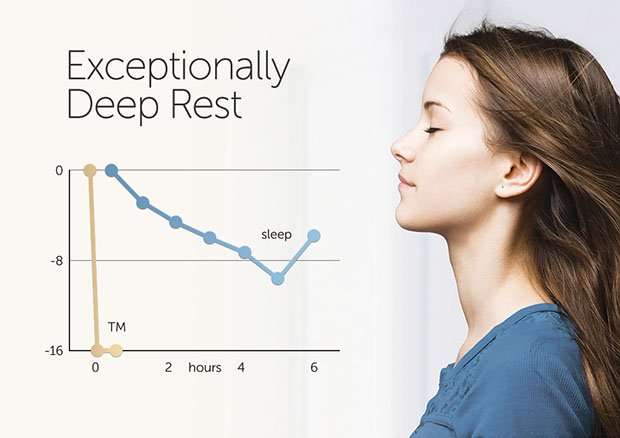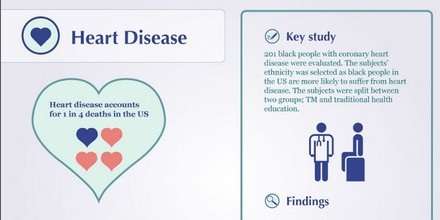Over 350 peer-reviewed scientific studies have been conducted on the effects of practicing the Transcendental Meditation technique. We put together an infographic to give a clear overview of the most important health benefits associated with the Transcendental Meditation technique.
Please click on the image below to enlarge / download the infographic!
What is the Transcendental Meditation technique?
- Simple, natural, effortless technique practiced 2x 20 minutes daily
- Practiced in a comfortable sitting position with eyes closed
- Not a religion, philosophy, or lifestyle
- Founded by Maharishi Mahesh Yogi
- Taught by qualified teachers over 4 days, using a 7 step procedure
- Over 6 million people have learned the practice
- Over 350 published research studies confirm the benefits
Studies on Transcendental Meditation
TM has been enjoying a resurgence in recent years. This infographic is based on a selection of key research findings confirming the benefits of TM practice for mental and physical wellness.
Heart Disease
Background facts: Heart disease accounts for 1 in 4 deaths in the US.
Coronary heart disease alone costs the United States $108.9 billion each year.
(Heidenreich PA, Trogdon JG, Khavjou OA, et al. Forecasting the future of cardiovascular disease in the United States: a policy statement from the American Heart Association. Circulation. 2011;123:933-44. Epub 2011 Jan 24)
Key study: 201 black people with coronary heart disease were evaluated. The subjects’ ethnicity was selected as black people in the US are more likely to suffer from heart disease. The subjects were split between two groups; TM and traditional health education.
Findings: During an average follow-up of 5.4 years, the consequences of coronary heart disease (mortality, myocardial infarctions, or stroke) for the TM group was reduced by 48%.
Stress Relief
Background facts: 1 in 5 in the US report feeling extreme stress.
75% of US healthcare costs are associated with chronic illness — stress is the number one cause of chronic illness.
Key study: 19 subjects practicing TM and 16 subjects who didn’t were all tested for catecholamine levels. The aim was to evaluate the sympathetic-adrenal medulla, which releases catecholamines into the blood. These affect heart rate, blood pressure and blood vessel constriction.
Findings: Norepinephrine levels (a type of catecholamine, which are associated with stress) were significantly lower in the Transcendental Meditation group. The study concluded that the regular practice of TM has a significant effect on the sympathetic-adrenal medulla system.
Blood Pressure
Background facts: High blood pressure costs the US $47.5 billion each year.
348,000 US deaths in 2009 included high blood pressure as a primary or contributing cause.
Hypertension ranks globally as the leading chronic risk factor for mortality, accounting for 13.5% of all deaths worldwide.
An article, produced by the AHA, reviewing the most recent trials summarised that TM lowers blood pressure and it can therefore be recommended in clinical practice.
‘Transcendental Meditation may be considered in clinical practice to lower BP’ – American Heart Association
Work Efficiency
Background facts: A 2012 US survey found that 24% of people waste between 30-60 mins a day, with 11% claiming they waste even more.
Key study: A 3 month study on staff in a large manufacturing plant and a sales distribution company, both in the automotive industry. The effects of the TM technique on stress reduction, health, and employee development were all evaluated.
Findings: Those who learned Transcendental Meditation showed reduced physiological arousal, decreased trait anxiety, job tension, insomnia, and fatigue.
School Performance
Background facts: In 2013 the US Dept. of Education reported that 19% of high school graduates are illiterate.
Key study: 50 college students were tested for the effects of Transcendental Meditation on Brain Integration Scale scores, electrodermal habituation to 85-dB tones, sleepiness, heart rate, respiratory sinus arrhythmia, and P300 latencies. Students were split into two groups, with the second group joining the TM practice after 10 weeks.
Findings: The group who attended the full meditation course yielded significant group vs treatment interactions for Brain Integration Scale scores, sleepiness, and habituation rates. The second group showed fewer improvements, or no change at all.
Mental health and emotional well-being
Background facts: Anxiety disorders are the most common mental illness in the U.S., affecting 40 million adults aged 18 and older (18% of U.S. population).
Key study: 27 subjects were investigated for brain coherence during an eyes-closed rest, Transcendental Meditation practice, and computerized reaction-time tasks.
Findings: Frontal brain coherence and lateralized asymmetry were higher in 13 Transcendental Meditation subjects, compared to the 12 other subjects. As frontal EEG coherence reflects structural and functional connection between brain areas, this in turn correlates with more positive psychological traits (e.g. emotional stability, security, high self-esteem, easiness with others, inner orientation).
Alcoholism treatment
Background facts: Globally, alcohol use is the fifth leading risk factor for premature death and disability; among people between the ages of 15 to 49, it is the first.
In 2006 alcohol problems cost the U.S. $224 billion – primarily from lost productivity, health care, and property damage costs.
Key study: Severe alcoholics from a veteran’s home were randomly assigned to Transcendental Meditation groups, while others were assigned to different therapy groups. Intensive follow-up procedures were implemented, and information on alcohol consumption and other parameters was collected over an 18-month period.
Findings: 6,12 and 18 months after leaving the treatment facility, the TM group exhibited a significantly higher percentage of non-drinking days, when compared to the routine therapy and neurotherapy groups.
Quitting Smoking
Background facts: Cigarette smoking causes roughly one in every five deaths in the US.
Life expectancy for smokers is at least 10 years shorter than for non-smokers.
Key study: 226 smokers learning the TM technique and 850 who didn’t. All subjects were asked to complete a questionnaire on their smoking habits. After 20-24 months a follow up questionnaire was undertaken, both on smoking habits and the regularity of Transcendental Meditation practice.
Findings: 51% of those fully adherent to TM practice had quit smoking and an additional 30% had decreased the number smoked daily by at least 5 cigarettes. For those partially adherent to Transcendental Meditation practice, these numbers were respectively 21% and 34%. In the non-TM group, 21% had quit smoking and 12% had reduced the number of cigarettes smoked daily by at least 5.

















